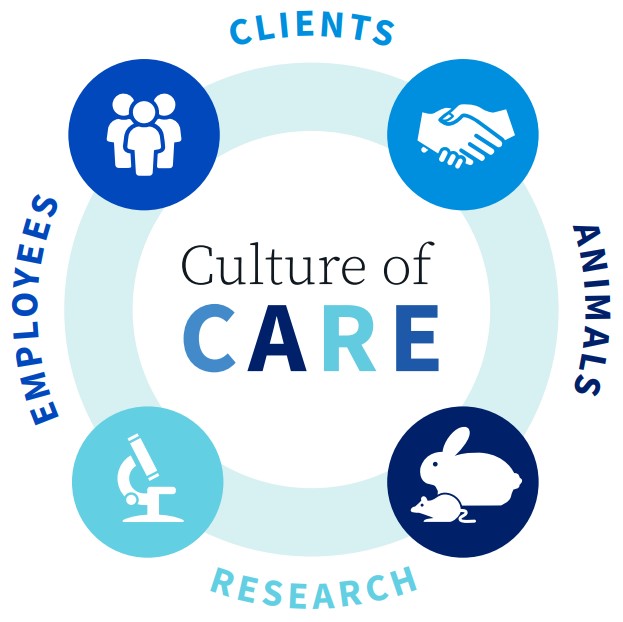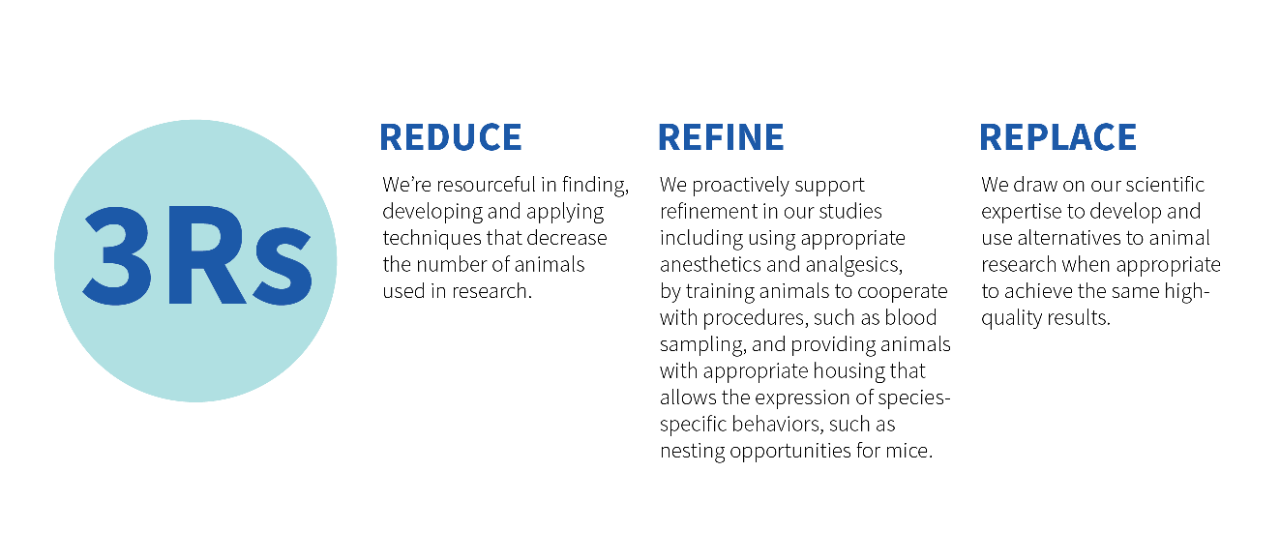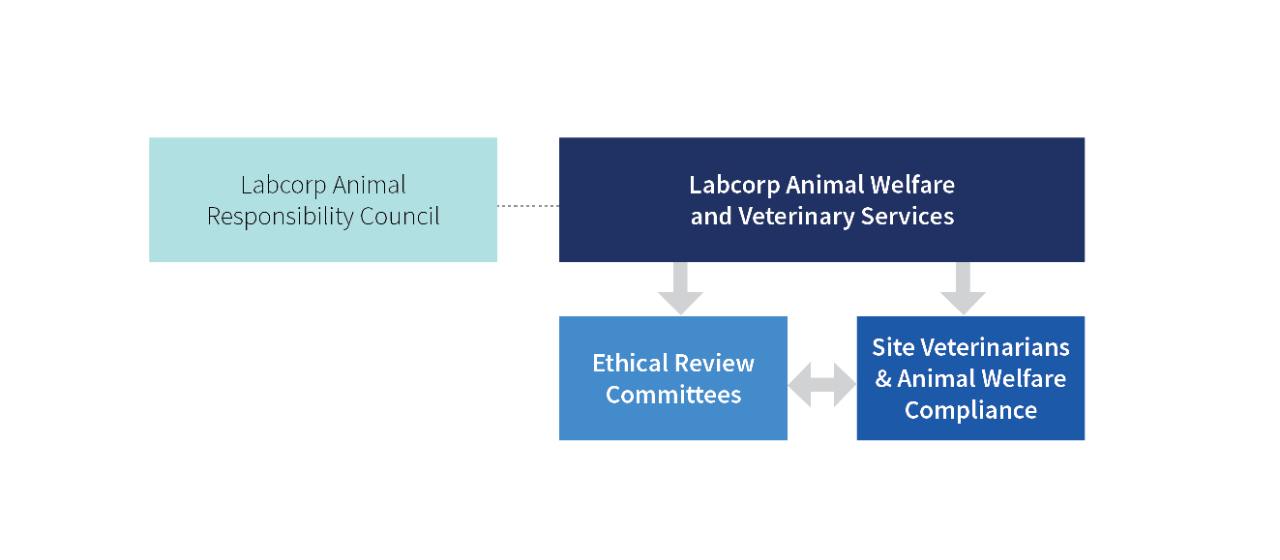Over the past 30 years, we’ve established and maintained a corporate culture that makes animal welfare a top priority. From our commitment to the 3Rs to our careful adherence to government regulations, we strive every day to make sure we treat our research animals humanely and with respect.

Culture of CARE
Recently our Culture of CARE has taken a new focus on an all-inclusive culture, where Clients, Animals, Research, and Employees are at the heart of our attention and respect. To mark this event, we held a global rollout including renewed commitments, vision statement, and a new animal welfare awareness training.

Our vision is a culture where staff and stakeholders are united in a strong commitment to CARE, which is firmly founded on the 3Rs and embraces innovative advances in animal welfare.
We’re Committed to the 3Rs:
We continue to develop and implement technologies that advance our commitment to innovation and the 3Rs:

Proper and humane care for research animals is not just the right thing to do, it’s also fundamental to ensuring the safety and effectiveness of new medicines that improve and save the lives of people and animals all over the world. We’ve taken meaningful steps toward building and maintaining a corporate culture that makes animal welfare a top priority.
Our global 3Rs Working Group: Great Science and Animal Welfare
Employee representatives from around the world contribute to our Global 3Rs Working Group, fostering respect and compassion for research animals. The group communicates directly with fellow employees to reiterate the clear links between excellent animal welfare, great science and commercial success. The group also conducts our Global 3Rs Recognition Program.
Global 3Rs Recognition of Employee Commitment to Animal Welfare
Our Global 3Rs Recognition Program celebrates employees who have developed innovative ways to improve animal welfare and research results. It also establishes role models within the company. Winners of our Global 3Rs Recognition Awards draw on their inventiveness and scientific expertise to help ensure high-quality research, while finding new and more efficient ways to improve how we use and care for research animals. Submissions have more than doubled in recent years.
Here Are Just a Few Examples of Putting our Beliefs into Action:
Our Labcorp Animal Responsibility Council sets global animal welfare standards in partnership with colleagues and monitors animal welfare performance at Labcorp globally.
Our Animal Welfare and Veterinary Services works closely with our Operations team and conducts regular audits of all our animal facilities and vendors.
Our global Labcorp Animal Responsibility Council regularly provides global oversight for animal welfare at Labcorp.

Our Institutional Animal Care and Use Committees (IACUC) and other animal welfare review boards include veterinarians, scientists, members of our professional staff and at least one member of the public. These teams consider whether a study is necessary, and whether animals need to be involved. They then review and approve or make changes to study designs before any research can begin. They also periodically review Labcorp’s animal care and use program, inspect our research facilities, and investigate any animal welfare concerns.
Labcorp participates in the voluntary accreditation program of AAALAC International, which includes triennial on-site visits to ensure that we are meeting or exceeding prescribed standards of policies, animal housing and management, veterinary care and facilities.
We are regularly inspected by animal welfare regulatory authorities
Did You Know?
We constantly strive to improve the range of in vitro testing as an alternative to animal research, and we work with organizations and agencies all over the world, including The National Centre for the Replacement, Refinement & Reduction of Animals in Research (NC3Rs) and others that promote alternative in vitro testing. At all our research and development sites, we offer in vitro testing from the Discovery phase through to the Pre-Clinical phase of the drug development process. Computer modeling and in vitro, or cell-based, testing can help us distill the plethora of possible compounds down to those few with the best chance of helping patients. Wherever possible, we promote the routine use of in vitro testing and have already replaced some animal testing with in vitro methods.
European Federation of the Pharmaceutical Industry and Associations (EFPIA) 3Rs brochure
We Believe Transparency Increases Understanding
Whether you are a Labcorp partner, private citizen or public official, you want to be assured that we are open about our commitment to respectful and caring treatment of research animals.
Transparency about the use and treatment of animals in our care is critical to our relationships with others in the scientific community.
Concordat on Openness on Animal Research
Labcorp is among the more than 70 original signers of the United Kingdom’s Concordat on Openness on Animal Research. These include pharmaceutical companies, universities, contract research organizations, nonprofit associations, and related organizations.We are committed to abiding by the Concordat’s guidelines and fulfilling its four commitments to enhance our communications about our use of animals.
Transporting Animals Safely
Our focus on animal welfare extends to the time before they arrive at our facilities. We ensure they are transported by environmentally controlled vehicles or airplanes, and their care during transit is regulated by various agencies throughout the world. We select only those carriers that comply with regulations and have the ability to provide appropriate care. Our staff and Labcorp veterinarians monitor the carriers to help ensure animal welfare.
Continued Proactive Improvement to Animal Welfare
Some activities that demonstrate our appreciation for Animal Care and welfare include:
- Enrichment Committees that focus on ways to enrich our animal’s quality of life through environmental improvements, food and treats, and toys and puzzles.
- Global 3Rs recognition program.
- Compassion Fatigue Committees devoted to supporting staff. Creation of Memory Gardens by staff to provide an area for reflection and to commemorate the animals they have worked with.
- Adoption program where retired canines and felines find homes with employees.
Connect
Let's start a conversation
Contact Us